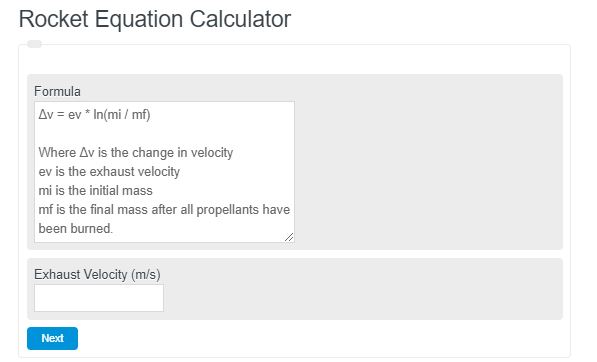Enter the exhaust velocity, initial mass, and final mass of a rocket to calculate the change in velocity of that rocket.
- Instantaneous Velocity Calculator
- Acceleration Calculator
- Orbital Speed Calculator
- Thrust Calculator
- Delta-V Calculator
- Exhaust Velocity Calculator
- Orbital Kinetic Energy Calculator
Rocket Equation Formula
The following equation is used by the calculator above to calculate the change of velocity of a rocket.
Δv = ev * ln(mi / mf)
- Where Δv is the change in velocity
- ev is the exhaust velocity
- mi is the initial mass
- mf is the final mass after all propellants have been burned.
Conceptually this formula can be described as the change of velocity being the difference between the initial and final velocity which are dependent on the masses and the escape velocity of the exhaust. In this case, the initial velocity is assumed to be 0 since the rocket has not launched yet.
Another important aspect in this equation to keep in mind is that since the velocity is dependent on the natural log of a ratio of masses, the masses should be the same units, but the units don’t affect the outcome.
Rocket Equation Definition
The rocket equation defines the relationship between the velocity of an object and exhaust speed and mass. In other words, it’s a way of describing the conservation of mass when applied to the mass.
How to calculate rocket speed?
How to calculate rocket speed?
- First, determine the exhaust velocity.
Calculate the velocity of the exhaust coming out of the rocket.
- Next, determine the initial mass.
Measure the initial mass of the rocket and fuel.
- Next, determine the final mass.
Measure the final mass of the rocket after the fuel has been burned.
- Finally, calculate the rocket speed.
Calculate the speed of the rocket using the formula above.
FAQ
The rocket equation is the formula for calculating the speed of a rocket based on mass and velocity of the exhaust.

